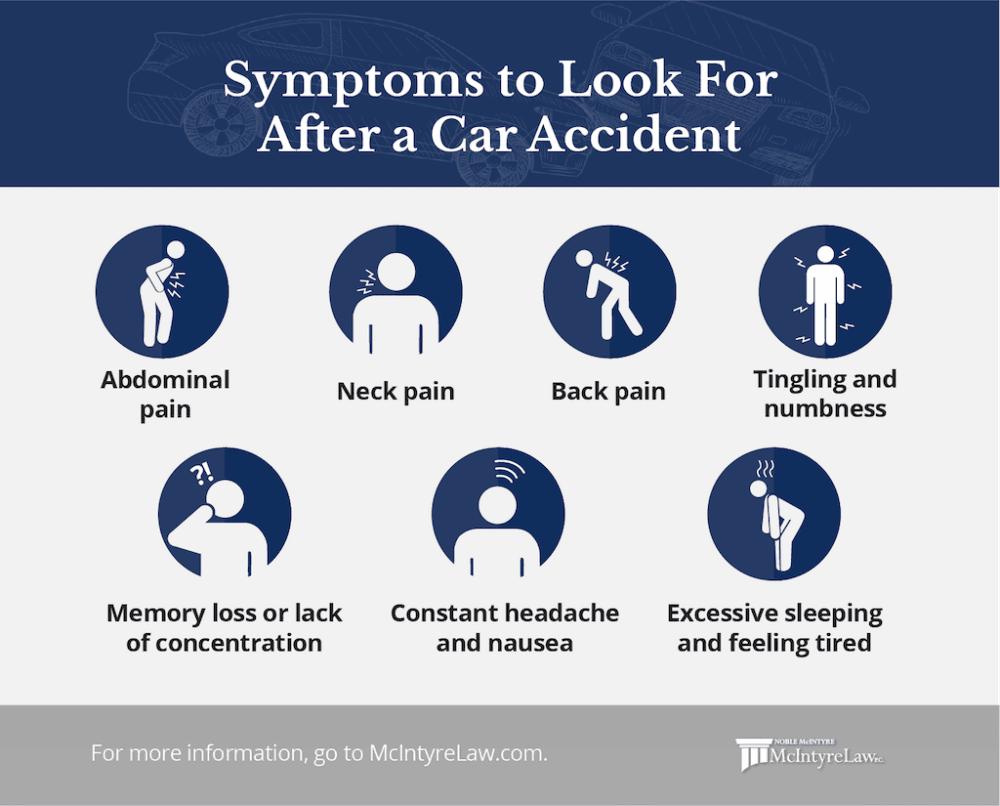What to Do When You Experience Delayed Pain After an Accident
Given the speed and force involved when motor vehicles collide, it’s no surprise that the results can be severe. You should consider yourself lucky if you don’t have to leave the scene in an ambulance. But you could still be hurt and not know it yet. Some injuries don’t present themselves right away, and pain after a car accident can be delayed for hours or days, even weeks.
How long should you be sore after a car accident? What does it mean if you’re sleeping a lot or you’re having trouble remembering things? How long do you have to go to the hospital after a car accident? Here, we’ll try to answer some of these questions so you can get the help you need and move on with your life.
What should you expect physically and mentally after being in an accident?
It’s not unusual to have psychological symptoms after a car accident. Most experience shock symptoms ranging from dilated pupils to nausea. If you’re diagnosed with this condition at the accident scene, you may be taken to the hospital for treatment.
You may feel overwhelmed by what happened at the accident scene and by the emotional, physical, and legal consequences. Anxiety is typical, and depression can set in. Some people even develop post-traumatic stress disorder (PTSD) after a car accident.
These are serious conditions that shouldn’t be dismissed. Seek help if you’re experiencing any symptoms of anxiety, depression, or PTSD. You may also experience some physical symptoms after a car accident, and some don’t show up right away. But even these delayed symptoms need to be taken very seriously.
What symptoms should you look out for after a car accident?

- Abdominal pain. After a car accident, stomach pain can be a sign of damage to soft tissue from the impact, such as injuries to internal organs or internal bleeding. If you have stomach pain, feel dizzy, or develop large bruises, seek medical attention right away.
- Neck pain. This is a classic symptom of whiplash, which occurs frequently after rear-end collisions. The impact whips the head forward and back, leading to sprains and strains, herniated disks, and other spinal cord injuries. It may take hours or days for this symptom to show up, and can last for days, months, or even be permanent.
- Back pain. After an accident, back problems can limit your mobility, everyday activities, and ability to work. Back pain after a car accident can be the result of soft-tissue damage, slipped or herniated disks, whiplash, or spinal injuries. Back pain can plague you for months or even years, so seek treatment right away if you experience it after an accident.
- Tingling and numbness. If you hit your head during a car accident and experience numbness or a feeling of pins and needles somewhere on your body, it could be a subtle sign of brain injury and a larger problem with your nervous system. Other sources could be a pinched nerve or a herniated disk, but this sensation could be the alarm bell for a much larger medical problem, so see a doctor immediately.
- Memory loss or lack of concentration. Over time, you may have trouble remembering or struggle to concentrate on a task. Car crashes can lead to a long list of emotional and psychological problems. But these issues can also be caused by a traumatic brain injury (TBI) you sustained in a collision. The sooner you get checked out by a medical professional, the sooner you can start your recovery.
- Constant headache and nausea. People often get a headache after a car accident, or feel nauseous. But it could be something more serious. Headaches could be from whiplash, other neck injuries, or a blood clot. The combination of a headache and nausea is extremely worrying and may point to a concussion or a more severe TBI. Hitting your head during a collision may have altered your brain or damaged your brain or brainstem. You may have a medical emergency, so see a doctor right away.
- Excessive sleeping and feeling tired. After the adrenaline wears off from an auto accident, people often feel exhausted. And if your body is healing, you may have low energy. But if you’re sleeping a lot after a car accident, and exhaustion persists, you might have a larger problem. You may be experiencing depression. Or you could have a TBI, which can affect sleep. Both are serious problems, so seek medical attention as soon as possible.
What if your pain was delayed?
Many people experience pain after a car accident, and delayed symptoms are common. For instance, you may notice soreness in your neck or shoulders, start to have abdominal pain, or get headaches hours or days after the accident. If you’ve been in a car wreck, it’s best to get examined right away, especially if you have any symptoms.
If you plan on claiming injuries with insurance, it’s important to know how long you have to go to the hospital after a car accident. Check with the insurance company. In Oklahoma, you have two years from the date of the accident to file a car accident lawsuit. But the longer you wait to receive medical attention, the harder it is to make your case for personal injury.
Can you still get compensated for your injuries?
Your insurance company, or the at-fault-driver’s insurance carrier, will help cover your medical costs. But delayed pain and other symptoms after an accident are common, and it can be hard to prove to an insurance company that the new injuries are related to the same wreck.
Even if the carrier agrees to cover the new medical costs, it’s best to talk to a car accident attorney before signing anything. You don’t want to give away your right to file a lawsuit in case your situation worsens. Sometimes, filing a lawsuit is the only way to get the kind of compensation you actually need. And you can’t wait too long to file. The statute of limitations in Oklahoma is only two years from the date of the accident.
How can you know that you won’t experience any more symptoms?
Symptoms after a car accident can be relatively short-lived and harmless, and some can be deadly. But you won’t know until you get examined by a medical professional. Some conditions will go away after a few days, and some injuries could last a lifetime. The sooner you identify severe injuries, the better chance you have of doing something about them.
How long after a car accident can you claim injury in Oklahoma?
How long after a car accident you have to claim an injury depends on where you live. You’ve got two years from the date of the crash to file a lawsuit in Oklahoma. But you shouldn’t wait that long. Proving a case gets more difficult as time passes. How can a doctor testify to the injuries you got in the auto wreck if you wait weeks or months to get examined? It’s better for your case — and better for your health — if you see a doctor right away.
Don’t settle immediately and get help with your case
After going through an automobile, truck, or motorcycle accident, it’s understandable to want to move on with your life quickly. But even so, you shouldn’t accept a settlement from an insurance company right away without talking to a lawyer first. Insurance companies don’t make money by handing out generous settlements — they make their profit by limiting them.
Will it be enough to cover all your medical treatment, for as long as needed? What about lost wages? Pain and suffering? The only way to make sure you get the compensation you need is to get the advice of a good lawyer, like the Oklahoma car accident attorneys at McIntyre Law.
What kinds of injuries have delayed onset or get worse over time?
Injuries and pain after a car accident can be delayed for days or weeks. If you accept a settlement too quickly, it might not cover those newer conditions. The following kinds of injuries can have a delayed onset after a car accident.
Whiplash
When you get into a car wreck, the vehicle comes to a sudden stop and forces passengers’ heads to move rapidly back and forth. That’s called whiplash. The violent movement can do all sorts of damage, from simple muscle tears to serious damage to the spine and surrounding nerves. And it can be difficult to know you have it right away because the adrenaline in your system masks pain in the moment. Other symptoms, like memory problems and depression, can take longer to develop.
Concussion
A concussion is a traumatic brain injury that’s caused by a blow to the head, causing the brain to be jostled violently against the inside of the skull. Concussions can result in internal swelling and bleeding that can be life-threatening. Even seemingly minor concussions can have long-term effects, and symptoms like changing personality, fatigue, memory problems, and vision problems may not be noticeable until days, weeks, or months later.
Internal bleeding
Internal bleeding may go unnoticed for several days because it can’t be seen on the surface. Unexplained large bruises, faintness, and pain can be indicators as time passes. Internal bleeding can be deadly, and immediate medical attention is needed.
Blood clot
When parts of your body are seriously injured, extensive internal bleeding can lead to blood clots forming over time. They can develop anywhere, but some of the most dangerous kinds of blood clots form in the legs, a condition known as deep vein thrombosis (DVT). They can break loose and travel to the lungs, where they block the pulmonary artery, leading to chest pain, faintness, and even death. Other clots form in the brain, placing pressure on it, which can lead to permanent brain damage or death.
Traumatic brain injury
Traumatic brain injuries (TBIs) can range from mild to severe. A TBI can result in a number of subtle symptoms that can go undetected for days, weeks, or months. Being excessively tired all the time, memory problems, vision problems, altered sense of taste or smell, and personality changes may all be caused by a TBI over time.
Spinal injury
Spinal cord injuries are serious and can lead to paralysis or death. Partial damage can worsen over time and even lead to death. Pain, tingling or loss of sensitivity, loss of movement, loss of bladder or bowel control, difficulty breathing, lack of balance, and weakness can all indicate a spinal injury.
Post-traumatic stress disorder
It’s important not to forget the impact that an accident can have on mental health as well. Post-traumatic stress disorder (PTSD) is a form of mental illness that a person develops after a highly stressful or scary event that’s outside of normal experience. It has been estimated that millions of Americans suffer from PTSD as the result of automobile accidents. What makes it difficult to diagnose is that anger, fear, disbelief, and guilt are all natural feelings to have after a crash. The difference with PTSD is that the symptoms don’t go away or get worse, limiting or changing your behavior. If you think you might have PTSD, talk to your doctor about treatment options.

